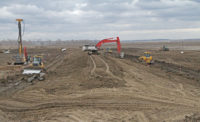While debate rages over whether the Keystone XL pipeline should be built for exporting Canadian oil sands to the U.S., the matter is a moot point in Whiting, Ind. There, more than 8,000 tradesmen are at work on the multibillion-dollar modernization of a BP refinery, an undertaking that will allow BP to process more heavy Canadian crude delivered by pipeline to the Midwest.
Situated on a 1,400-acre site touching three cities, the 121-year-old refinery is the sixth-largest facility of its kind in U.S. and the third in the Midwest to recently be upgraded or to introduce equipment for the purpose of processing thick, sulfur-laden Canadian crude.
With a current capacity of 405,000 barrels of oil a day, Whiting also is the region's largest such project to date to undergo modernization, though BP confirms only that costs are in the "several billion dollar" range.
The project's greatest challenge is logistics, says Jim Shoriak, BP project director. "We have some of the same requirements as a city," he says, noting the project required additional infrastructure—including a new roadway—and additional land for lay-down areas and equipment storage.
Combating Corrosion
Among other activities, BP is removing 40-year-old to 50-year-old refining equipment and replacing it with the components necessary for processing heavier crude. The first phase, to be completed later this year, calls for installing a new 12-pipe still—the primary distillation unit of the refinery. With stainless-steel-lined carbon steel piping, the still will be better able to withstand the more corrosive Canadian bitumen.
In all, more than 300 miles of piping—some up to 96 in. in diameter—will be installed in the still and elsewhere in the refinery.
BP also is replacing a small coker with a 102,000-bpd, six-drum unit that will process residual oils into gasoline and diesel fuel. Drums within the coker, one of the largest units of its kind in the world, each weigh 430 tons and measure 125 feet long and 30 feet in diameter.







Post a comment to this article
Report Abusive Comment